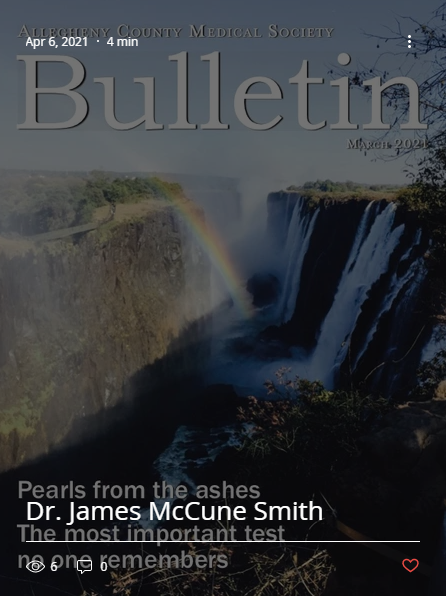
Because I wanted to be a doctor, my mother made sure I had books with female role models in medicine. As a girl, I read about “Molly Pitcher” giving Revolutionary War soldiers water to drink. I knew that Florence Nightingale was “the lady with the lamp” during the Crimean War and that Clara Barton was “the angel of the battlefield” during the American Civil War. I revered Elizabeth and Emily Blackwell for being the first and third women to earn allopathic medical degrees. But I didn’t know about Dr. James McCune Smith.
Growing up in Baltimore City Public Schools, I learned about the Rev. Dr. Martin Luther King, Jr., Rosa Parks and Jesse Owens. I wrote an essay about George Washington Carver and hundreds of ways to use peanuts. We read Dr. Benjamin Carson’s autobiography “Gifted Hands” and heard him speak at Johns Hopkins Hospital during a field trip. But I didn’t know about Dr. James McCune Smith.
As a pre-medical student in college, I majored in history with a concentration in science and medicine. One of my professors had written the history of medical education in the United States. I sighed and rolled my eyes when I had to read other books to write a paper about how women integrated mainstream medicine. My medical school included the usual amount of medical history, which is to say, very little. I even earned a doctorate in the history of medicine concentrating on Europe and the United States. But I didn’t know about Dr. James McCune Smith.
While compiling a list of notable physicians of color for an assignment in a new, upper-level medical school elective on “Race & Racism in Medicine” in spring 2020, I finally learned about the first African American to earn a medical degree: Dr. James McCune Smith.*
James McCune Smith was born indentured to Samuel Smith, a white merchant, and Lavinia Smith, an enslaved Black woman, on April 18, 1813. (The state of New York freed its slaves in 1827.) Denied admission to American colleges, McCune Smith traveled to Scotland, where he earned Bachelor of Arts (1835), Master of Arts (1836) and Medical Doctor (1837, with honors) degrees from the University of Glasgow. He returned to a hero’s welcome in New York City, where he opened the first pharmacy run by an African American. Dr. McCune Smith served as physician to the Colored Orphan Asylum, and he became deeply involved in abolitionism. Not only did he brilliantly refute the racist biology in Thomas Jefferson’s “Notes on the State of Virginia,” but he used sophisticated statistical analysis to challenge the claims in the 1840 U.S. Census that southern slaves were healthier and more moral than northern free Blacks and urban whites. Dr. McCune Smith gave lectures, wrote and edited in the Black press, and worked very closely with Frederick Douglas until his death from congestive heart failure Nov. 17, 1865, at the age of 52.
His own descendants did not know about their ancestor’s illustrious place in American medical history. He left behind a mixed-race wife, Malvinia, four sons and a daughter. All were marked as “white” in the 1870 Census, and the sons all married white wives (his daughter remained unmarried and had no children). His great-great-great-granddaughter discovered the family connection while doing a school research project: the James McCune Smith in her grandmother’s Bible was the James McCune Smith.
The Black Lives Matter protests in summer 2020 brought the harms of systemic racism into public discourse in a significant way. One laudatory essay written during Black History Month is inconsequential compared to improving mortality among Black mothers, ensuring equal access to pre-school and quality education, ending the school-to-prison pipeline and police brutality, and doing a better job of vaccinating BIPOC against COVID-19. Nevertheless, focusing only on Black victimhood tells an incomplete story. It is just as important to recognize the many ways in which Black Americans have succeeded despite or because of their oppression – and not only in February. Below is an extremely short list of reading suggestions for learning more about Black role models and their contributions to medicine. When you know better, do better.
*The first African-American doctor was likely Lucas Santomee, who studied in Holland and practiced in New York in the 1600s. James Durham learned medicine via informal apprenticeship and practiced in New Orleans in the late 1700s; neither was able to earn a medical degree. Rebecca Lee Crumpler was the first Black female MD (New England Female Medical College, 1864).
Further reading:
• Britt Rusert, Fugitive Science: Empiricism and Freedom in Early African American Culture (New York: NYU Press, 2017).
• Leslie A. Falk, “Black Abolitionist Doctors and Healers, 1810-1885,” Bulletin of the History of Medicine 54:2 (1980): 258-72.
• Thomas M. Morgan, “The Education and Medical Practice of Dr. James McCune Smith (1813-1865), First Black American to Hold a Medical Degree,” Journal of the National Medical Association 95:7 (2003): 603-14.
• Charles E. Wynes, “Dr. James Durham, Mysterious Eighteenth-Century Black Physician: Man or Myth?” The Pennsylvania Magazine of History and Biography 103:3 (July 1979): 325-33.

